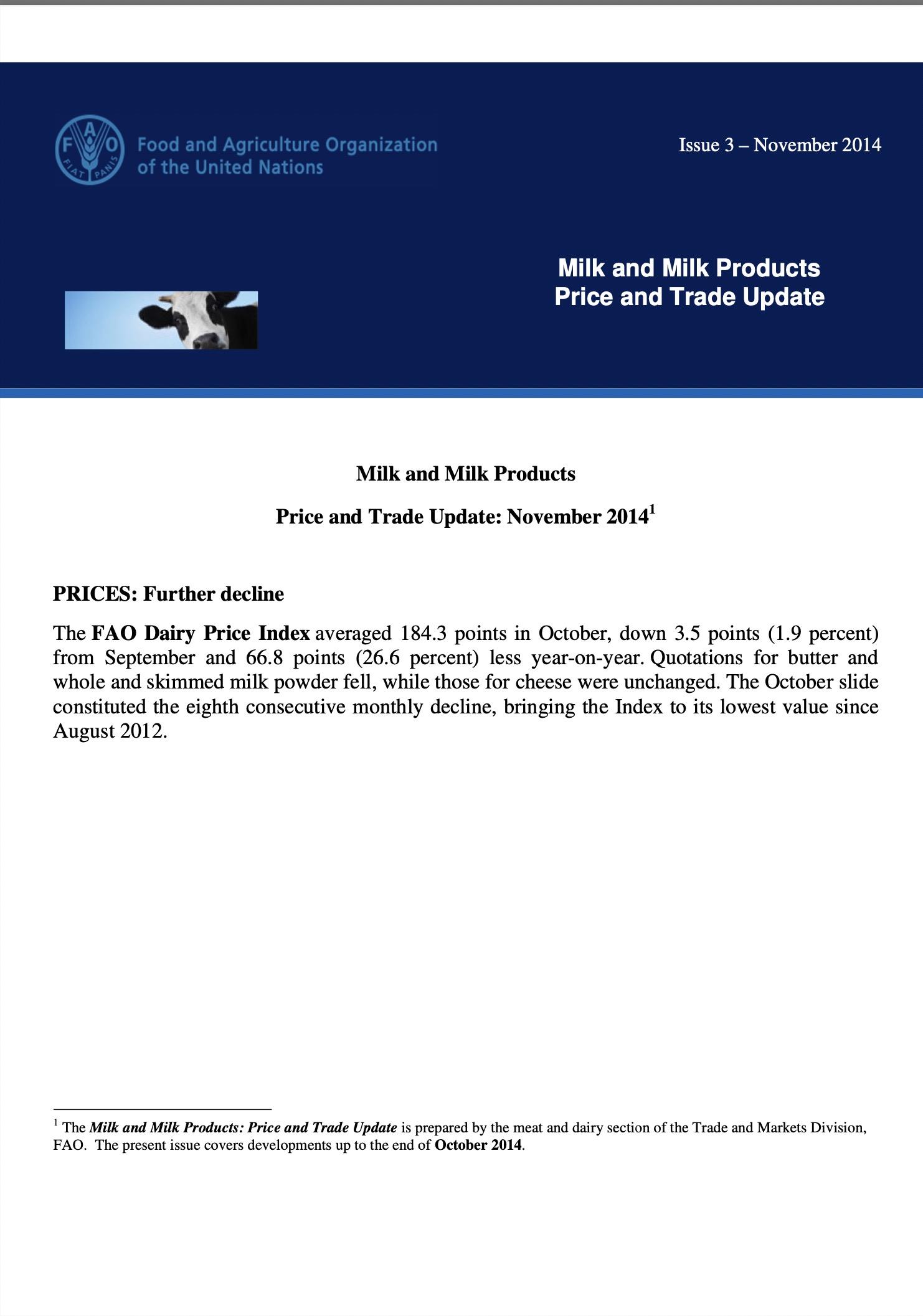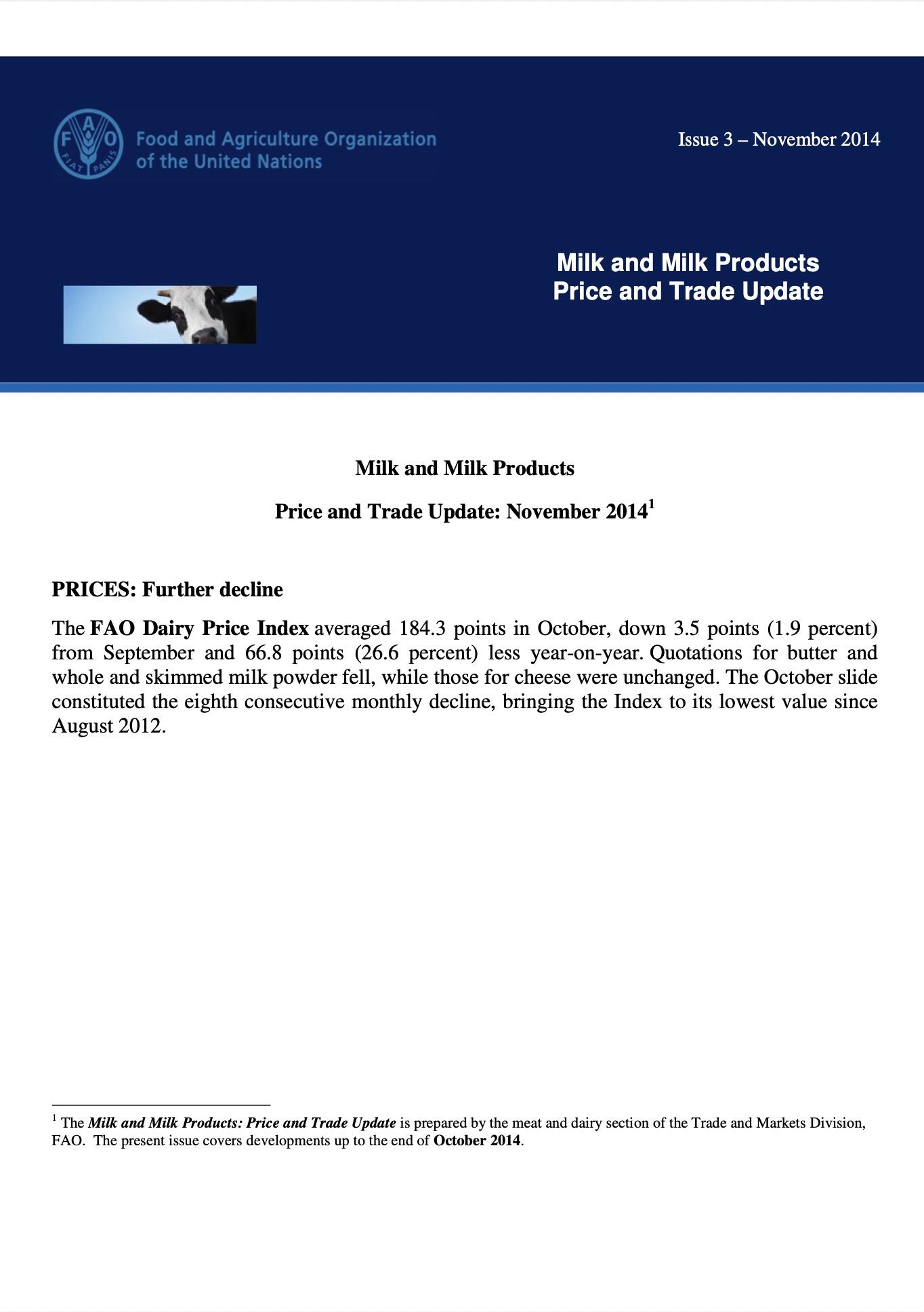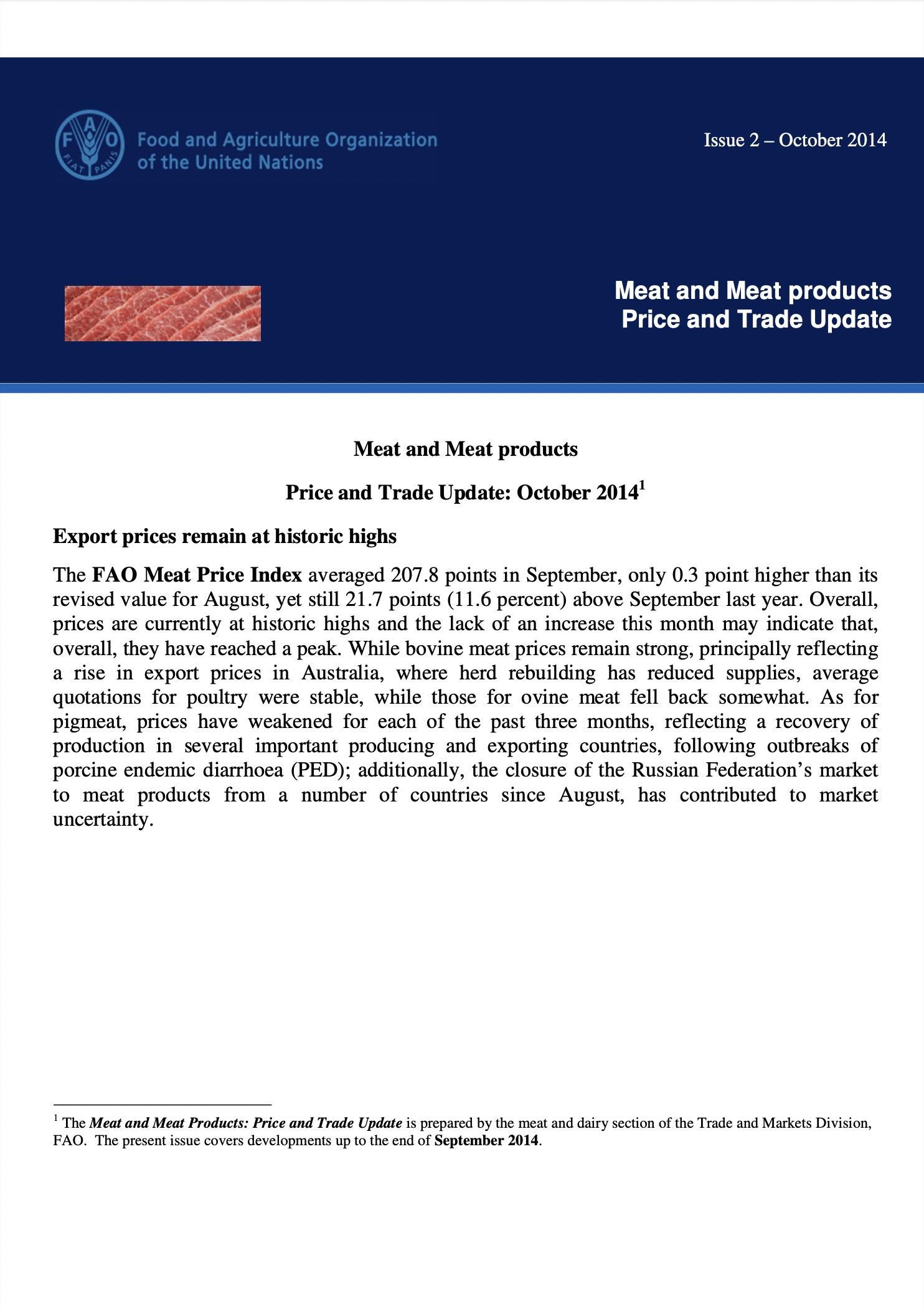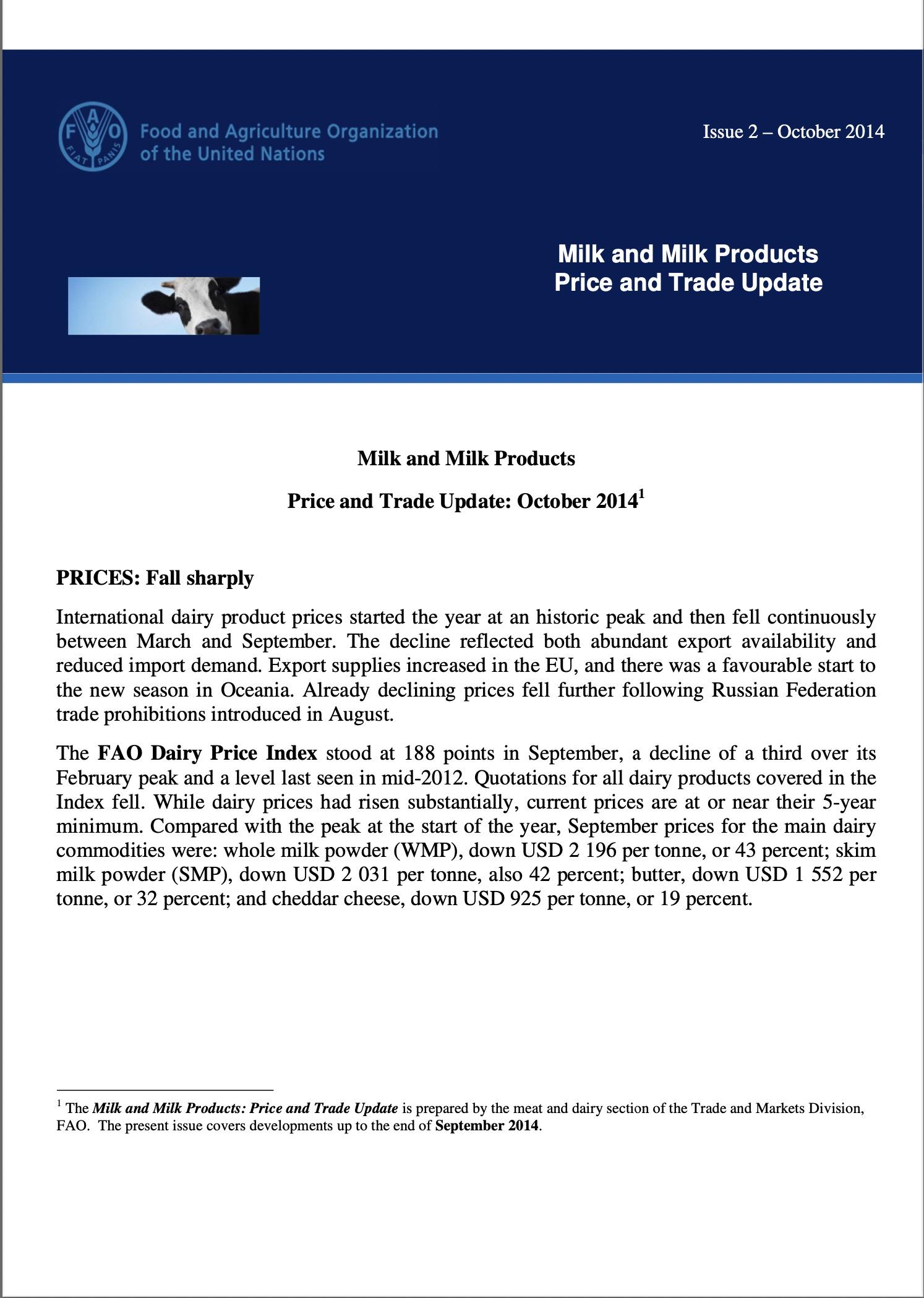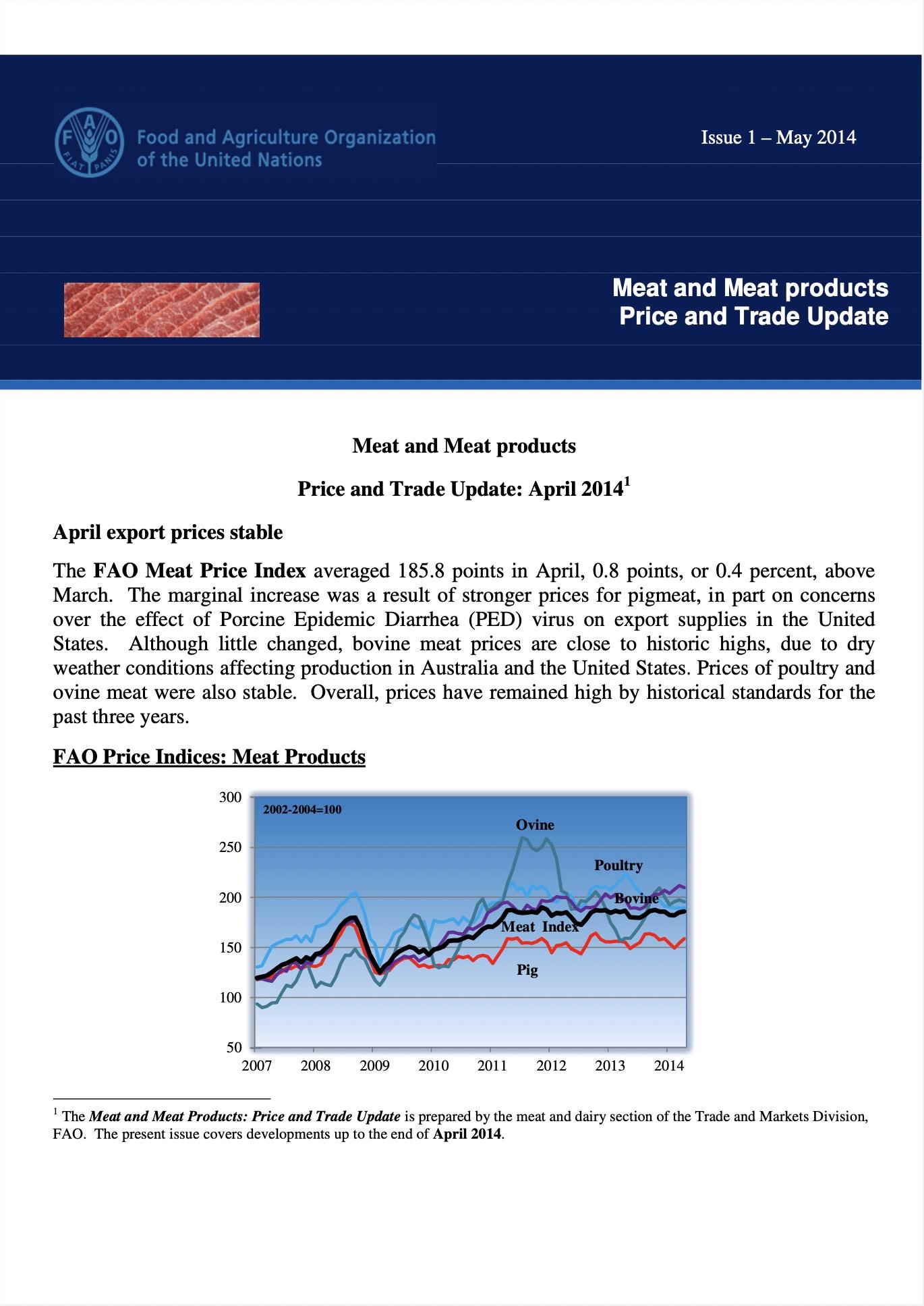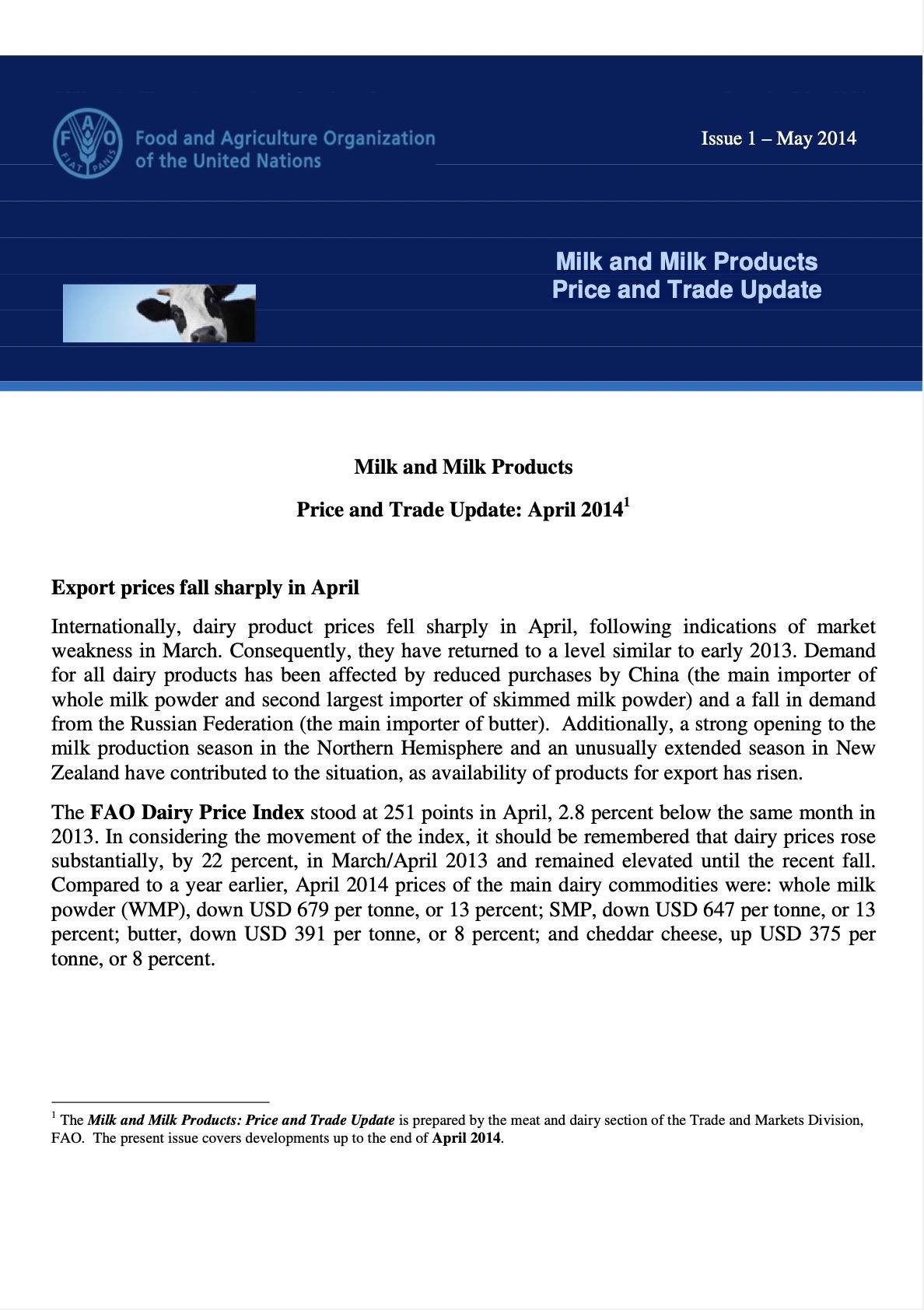
Principles for Responsible Investment in Agriculture and Food Systems
01/12/2014
Responsible investment in agriculture and food systems is essential for enhancing food security and nutrition and supporting the progressive realization of the right to adequate food in the context of national food security. Responsible investment makes a significant contribution to enhancing sustainable livelihoods, in particular for smallholders, and members of marginalized and vulnerable groups, creating decent work for all agricultural and food workers, eradicating poverty, fostering social and gender equality, eliminating the worst forms of child labour, promoting social participation and inclusiveness, increasing economic growth, and therefore achieving sustainable development.
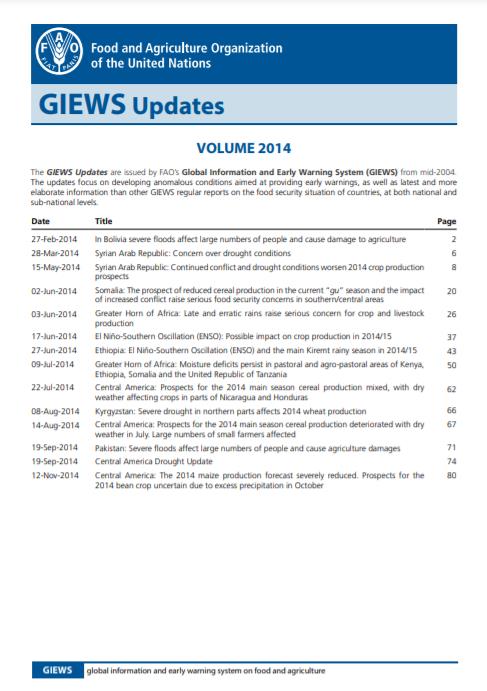
GIEWS Updates - Volume, 2014
04/11/2014
The GIEWS Updates are issued by FAO’s Global Information and Early Warning System (GIEWS) from mid-2004. The updates focus on developing anomalous conditions aimed at providing early warnings, as well as latest and more elaborate information than other GIEWS regular reports on the food security situation of countries, at both national and sub-national levels.
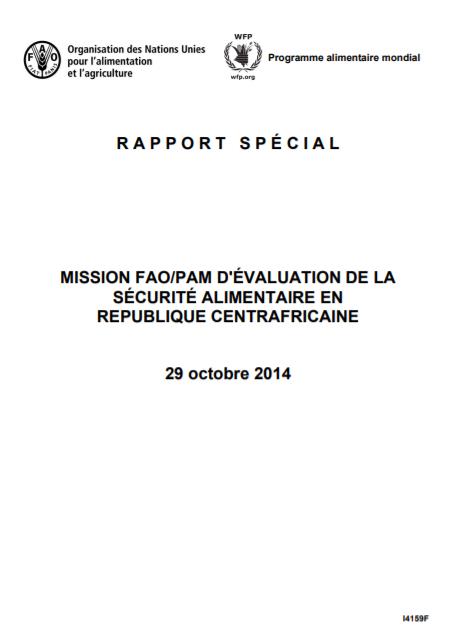
Rapport Spécial- Mission FAO/PAM d'évaluation de la sécurité alimentaire en Republique Centrafricaine
29/10/2014
À la demande du Gouvernement de la République Centrafricaine une mission conjointe FAO/PAM a visité le pays du 10 août au 13 septembre 2014 pour estimer le niveau des récoltes et évaluer la situation alimentaire générale. En plus du personnel de la FAO et du PAM, les équipes de terrain comprenaient des représentants du Ministère du Développement Rural, l’Institut Centrafricain des Statistiques et d’Etudes Economiques et Sociales, et 7 ONG nationales et internationales (World Vision, JUPEDEC, AIEC, COOPI, NDA, COHEB, Solidarités).
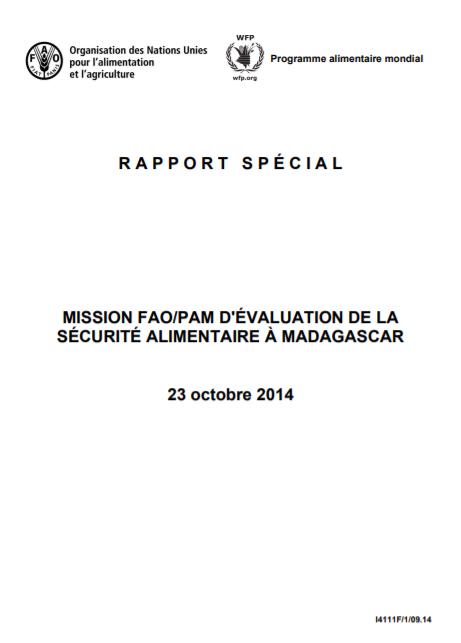
Rapport Spécial - Mission FAO/PAM d'évaluation de la sécurité alimentaire á Madagascar - 23 octobre 2014
23/10/2014
La Mission s'est rendue à Madagascar du 18 juin au 17 juillet 2014; elle a tout d'abord rencontré des représentants d'un certain nombre de ministères et d'institutions dans le pays, parmi lesquels le ministère de l'Agriculture, l'Institut national de la statistique (INSTAT), le ministère du Commerce, la Direction des douanes, l'Observatoire du riz (OdR), la Banque africaine de développement, l'Union européenne (UE), l'Agence des États-Unis pour le développement international (USAID) et la Banque mondiale, afin de recueillir des données sur la situation et les politiques du pays en matière d’agriculture et d'analys.
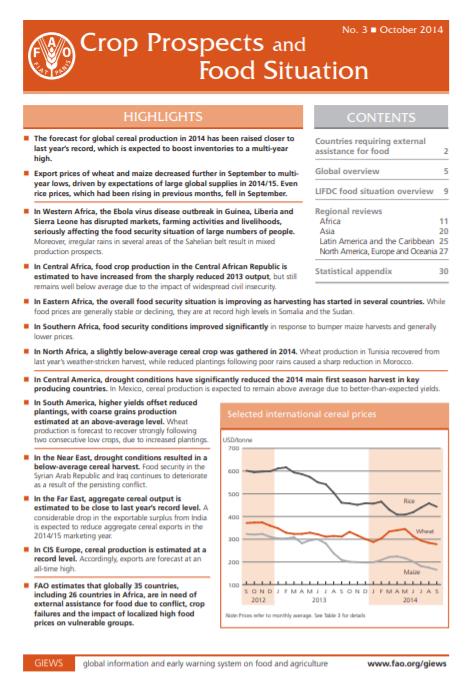
Crop Prospects and Food Situation #3, October 2014
09/10/2014
The forecast for global cereal production in 2014 has been raised closer to last year’s record, which is expected to boost inventories to a multi-year high. Export prices of wheat and maize decreased further in September to multiyear lows, driven by expectations of large global supplies in 2014/15. Even rice prices, which had been rising in previous months, fell in September.
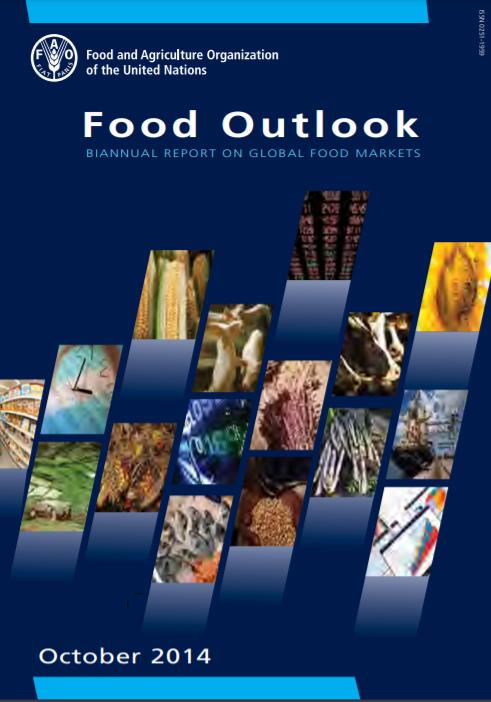
Food Outlook - October 2014
01/10/2014
Food Outlook is published by the Trade and Market Division of FAO under Global Information and Early Warning System (GIEWS). It is a biannual publication focusing on developments affecting global food and feed markets. Each report provides comprehensive assessments and short term forecasts for production, utilization, trade, stocks and prices on a commodity by commodity basis and includes feature articles on topical issues. Food Outlook maintains a close synergy with another major GIEWS publicat ion, Crop Prospects and Food Situation, especially with regard to the coverage of cereals. Food outlook is available in English. The summary section is also available in Arabic, Chinese, French, Spanish and Russian.
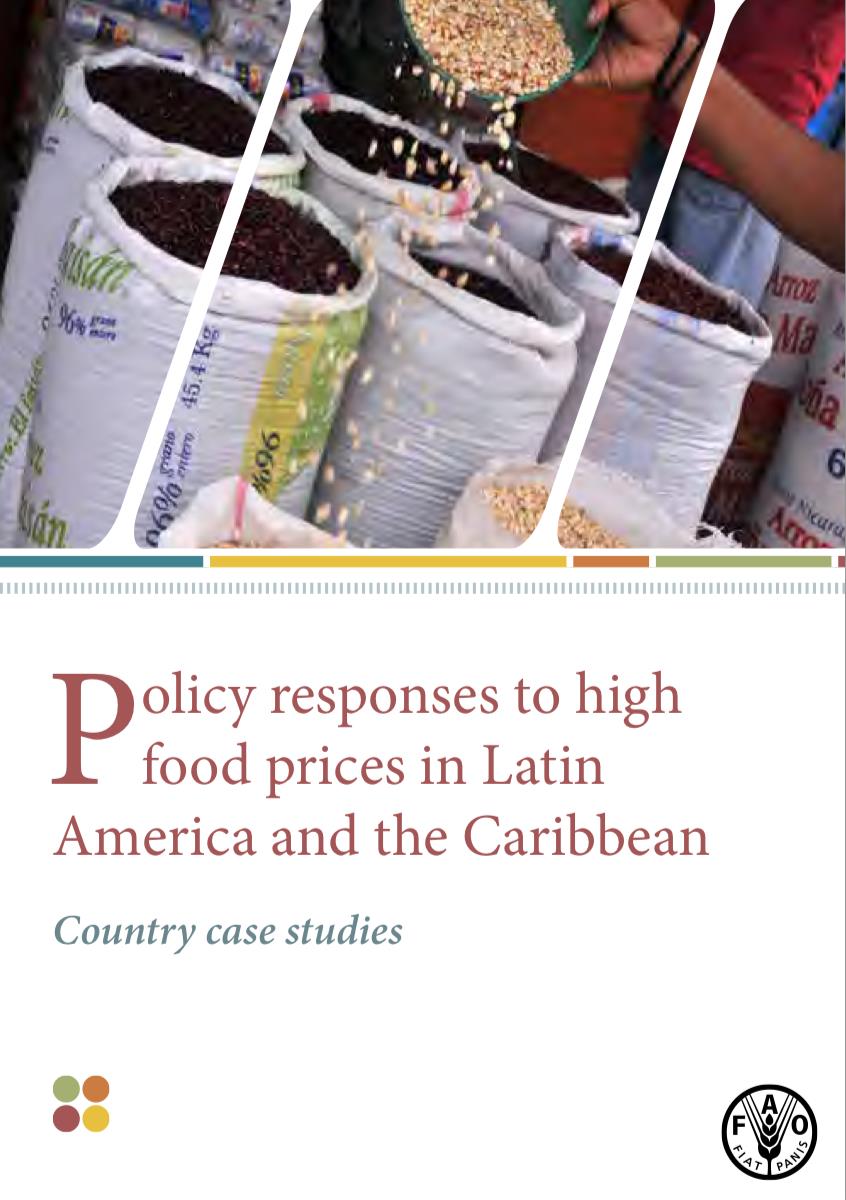
Policy Responses to High Food Prices in Latin America and the Caribbean
13/09/2014
This publication presents evidence with regard to the effectiveness of policies and programmes introduced in response to rising food prices in eight selected Latin American countries: Argentina, Bolivia, Brazil, the Dominican Republic, Ecuador, Mexico, Nicaragua and Peru. The case studies provide insights into the economic and policy environment at the time of the first price spike of 2007–08, analyse the measures that were introduced in response and discuss the evidence on the effects on the food security situation. As such they provide lessons learned in terms of the effectiveness of the different measures in achieving the intended food security goals, including the challenges encountered in their implementation. This evidence thereby contributes to the debate on appropriate policy responses to future price shocks, considering the complexity of determining short-term and long-term effects on producers, consumers and the fiscal accounts.
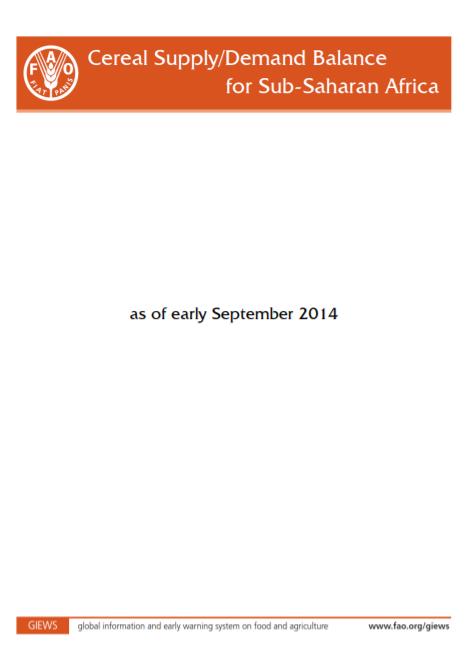
Cereal supply and demand balances for sub-Saharan African countries - No.3, September 2014
11/09/2014
The FAO/GIEWS Country Cereal Balance System (CCBS) is a database of annual supply and utilization balances for main cereals, covering all countries of the world. It has been maintained by FAO/GIEWS since 1980 and is updated on a continual basis. This statistical report, which is a subset of CCBS data, presents the current-year cereal supply and demand balances for all sub-Saharan African countries, highlighting cereal import and food aid requirements of each country. This report is complement ary to the FAO/GIEWS report Crop Prospects and Food Situation and is published four times a year, with the same schedule.
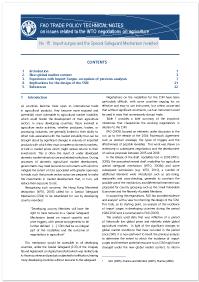
No. 15 Import surges and the Special Safeguard Mechanism revisited - September 2014
11/09/2014
This technical note revisits the analysis presented in Technical Note No. 9, updating data used in the identification of Import Surges to 2013 to capture recent changes in the global market context of higher and more volatile food prices and significant increases in volumes of imports to food deficit developing countries.
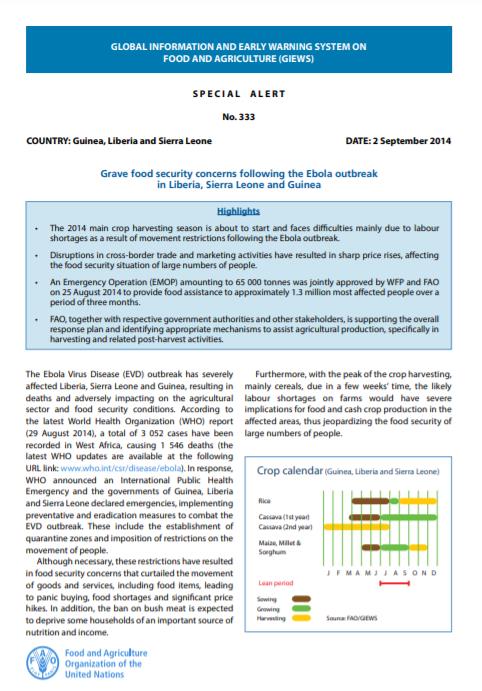
GIEWS Special Alert No. 333 - Guinea, Liberia and Sierra Leone, 2 September 2014
02/09/2014
The 2014 main crop harvesting season is about to start and faces difficulties mainly due to labour shortages as a result of movement restrictions following the Ebola outbreak. Disruptions in cross-border trade and marketing activities have resulted in sharp price rises, affecting the food security situation of large numbers of people. An Emergency Operation (EMOP) amounting to 65 000 tonnes was jointly approved by WFP and FAO on 25 August 2014 to provide food assistance to approximately 1.3 million most affected people over a period of three months. FAO, together with respective government authorities and other stakeholders, is supporting the overall response plan and identifying appropriate mechanisms to assist agricultural production, specifically in harvesting and related post-harvest activities.
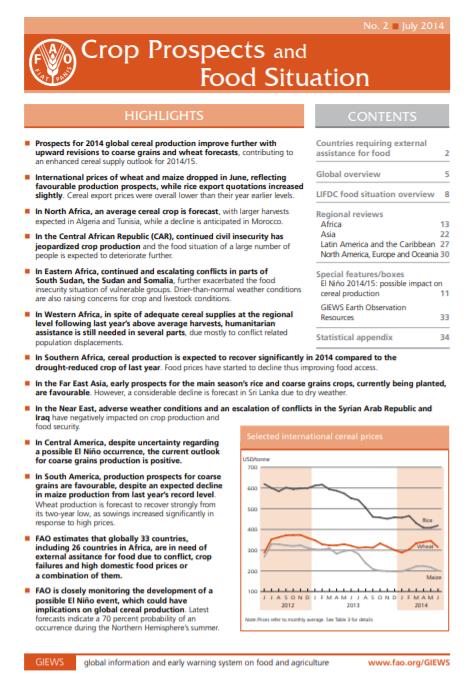
Crop Prospects and Food Situation # 2, July 2014
10/07/2014
Prospects for 2014 global cereal production improve further with upward revisions to coarse grains and wheat forecasts, contributing to an enhanced cereal supply outlook for 2014/15. n International prices of wheat and maize dropped in June, reflecting favourable production prospects, while rice export quotations increased slightly. Cereal export prices were overall lower than their year earlier levels.
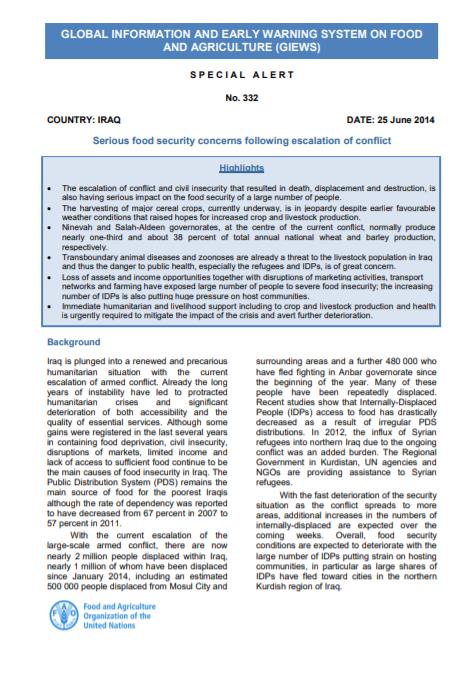
GIEWS Special Alert No. 332 - Iraq, 25 June 2014
25/06/2014
Iraq has been plunged into a renewed precarious humanitarian situation with the current escalation of armed conflict. Already the long years of instability have led to protracted humanitarian crises and significant deterioration of both accessibility and the quality of essential services. Although some gains were registered in the last several years in containing food deprivation, civil insecurity, disruptions of markets, limited income and lack of access to sufficient food continue to be the ma in causes of food insecurity in Iraq. The Public Distribution System (PDS) remains the main source of food for the poorest Iraqis although the rate of dependency was reported to have decreased from 67 percent in 2007 to 57 percent in 2011.
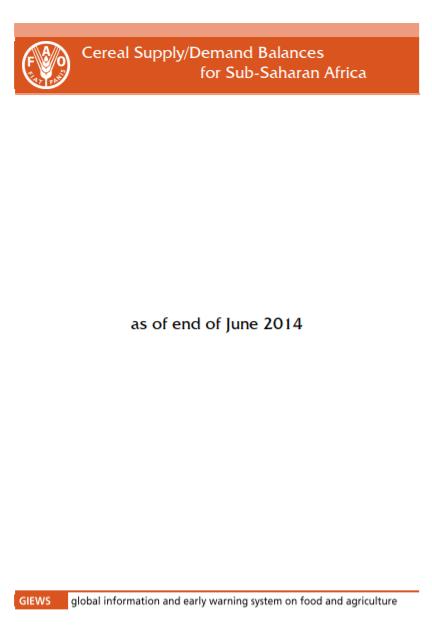
Cereal supply and demand balances for sub-Saharan African countries - No.2, June 2014
12/06/2014
The FAO/GIEWS Country Cereal Balance System (CCBS) is a database of annual supply and utilization balances for main cereals, covering all countries of the world. It has been maintained by FAO/GIEWS since 1980 and is updated on a continual basis. This statistical report, which is a subset of CCBS data, presents the current-year cereal supply and demand balances for all sub-Saharan African countries, highlighting cereal import and food aid requirements of each country. This report is complement ary to the FAO/GIEWS report Crop Prospects and Food Situation and is published four times a year, with the same schedule.
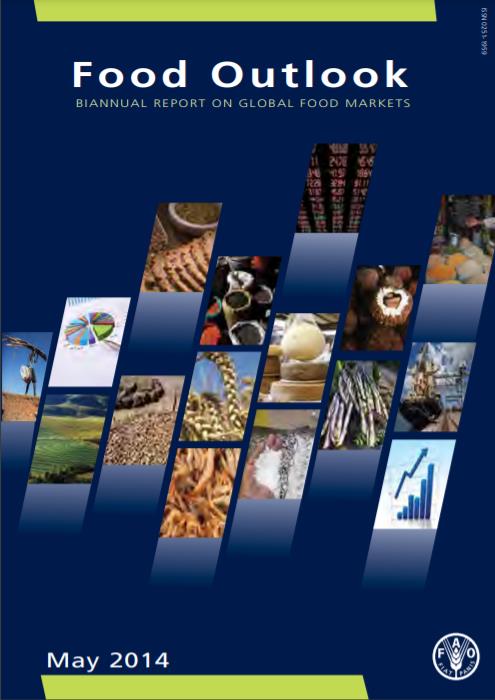
Food Outlook - May 2014
02/05/2014
Food markets have been affected by weather concerns and political tensions in the Black Sea region, which have boosted the FAO Food Price Index since February. While the 2014 global food import bill could stabilize at USD 1.29 trillion, animal product bills are set to increase, sustained by rising volumes and prices.

